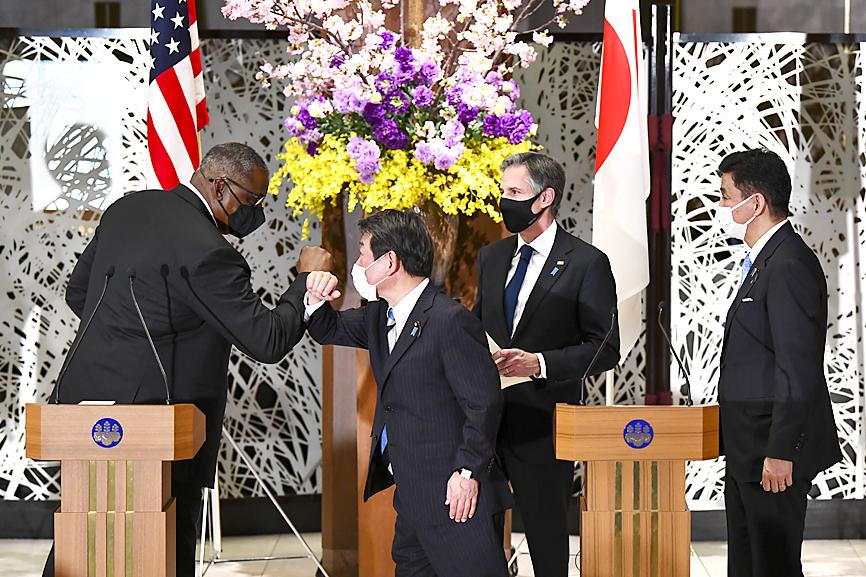The US and Japan yesterday warned Beijing against “coercion and destabilizing behavior” after top-level diplomatic and defense talks aimed at bolstering their alliance against rising Chinese influence.
US Secretary of Defense Lloyd Austin and US Secretary of State Antony Blinken are on their first overseas trip, which began on Monday in Japan, looking to shore up regional alliances and send a message to Beijing.
They are to continue on to South Korea, and a policy review by the new administration of its approach to Pyongyang is also a key part of the diplomatic outreach.

Photo: Bloomberg
However, discussions in Tokyo focused on China’s maneuvers in the region, including its increasing presence around islands claimed by Taiwan, China and Japan.
“China uses coercion and aggression to systematically erode autonomy in Hong Kong, undercut democracy in Taiwan, abuse human rights in Xinjiang and Tibet, and assert maritime claims in the South China Sea that violate international law,” Blinken said at a joint press conference.
“We’re united in a vision of a free and open Indo-Pacific region, where countries follow the rules, cooperate wherever they can and resolve their differences peacefully,” he said.
“We will push back if necessary, when China uses coercion or aggression to get its way,” he said.
In a joint statement, the US officials and their Japanese counterparts also warned that “China’s behavior, where inconsistent with the existing international order, presents political, economic, military and technological challenges.”
“The ministers committed to opposing coercion and destabilizing behavior towards others in the region,” they added.
The joint statement issued specifically referenced the “importance of peace and stability in the Taiwan Strait,” though Austin declined to comment on whether he agreed with a recent US assessment that Beijing could invade Taiwan within six years.
“My job is to make sure that we are as ready, as fast as we can possibly be to face any challenge that would face us or the alliance,” he said.
Issues from the coup in Myanmar to the way forward with North Korea were also on the table.
Blinken accused the Burmese military of “attempting to overturn the results of a democratic election,” saying it was “brutally repressing peaceful protesters.”
The joint statement called again for Pyongyang’s “complete denuclearization,” warning North Korea’s arsenal “poses a threat to international peace and stability.”
Blinken said that Washington was still examining “whether various additional pressure measures could be effective, whether there are diplomatic paths that make sense” as it reviews US policy on the issue.

The Ministry of the Interior (MOI) is to tighten rules for candidates running for public office, requiring them to declare that they do not hold a Chinese household registration or passport, and that they possess no other foreign citizenship. The requirement was set out in a draft amendment to the Enforcement Rules of the Public Officials Election and Recall Act (公職人員選舉罷免法 ) released by the ministry on Thursday. Under the proposal, candidates would need to make the declaration when submitting their registration forms, which would be published in the official election bulletin. The move follows the removal of several elected officials who were

The Republic of China (ROC) is celebrating its 114th Double Ten National Day today, featuring military parades and a variety of performances and speeches in front of the Presidential Office in Taipei. The Taiwan Taiko Association opened the celebrations with a 100-drummer performance, including young percussionists. As per tradition, an air force Mirage 2000 fighter jet flew over the Presidential Office as a part of the performance. The Honor Guards of the ROC and its marching band also heralded in a military parade. Students from Taichung's Shin Min High School then followed with a colorful performance using floral imagery to represent Taiwan's alternate name

FOUR DESIGNATED AREAS: Notices were issued for live-fire exercises in waters south and northwest of Penghu, northeast of Keelung and west of Kaohsiung, they said The military is planning three major annual exercises across the army, navy and air force this month, with the navy’s “Hai Chiang” (海強, “Sea Strong”) drills running from today through Thursday, the Ministry of National Defense said yesterday. The Hai Chiang exercise, which is to take place in waters surrounding Taiwan, would feature P-3C Orion maritime patrol aircraft and S-70C anti-submarine helicopters, the ministry said, adding that the drills aim to bolster the nation’s offshore defensive capabilities. China has intensified military and psychological pressure against Taiwan, repeatedly sending warplanes and vessels into areas near the nation’s air defense identification zone and across

A Chinese takeover of Taiwan would severely threaten the national security of the US, Japan, the Philippines and other nations, while global economic losses could reach US$10 trillion, National Security Council Deputy Secretary-General Lin Fei-fan (林飛帆) wrote in an article published yesterday in Foreign Affairs. “The future of Taiwan is not merely a regional concern; it is a test of whether the international order can withstand the pressure of authoritarian expansionism,” Lin wrote in the article titled “Taiwan’s Plan for Peace Through Strength — How Investments in Resilience Can Deter Beijing.” Chinese President Xi Jinping’s (習近平) intent to take Taiwan by force